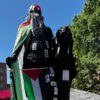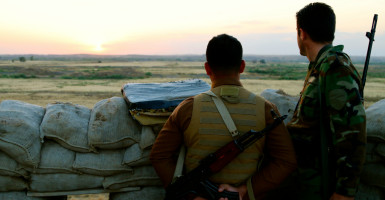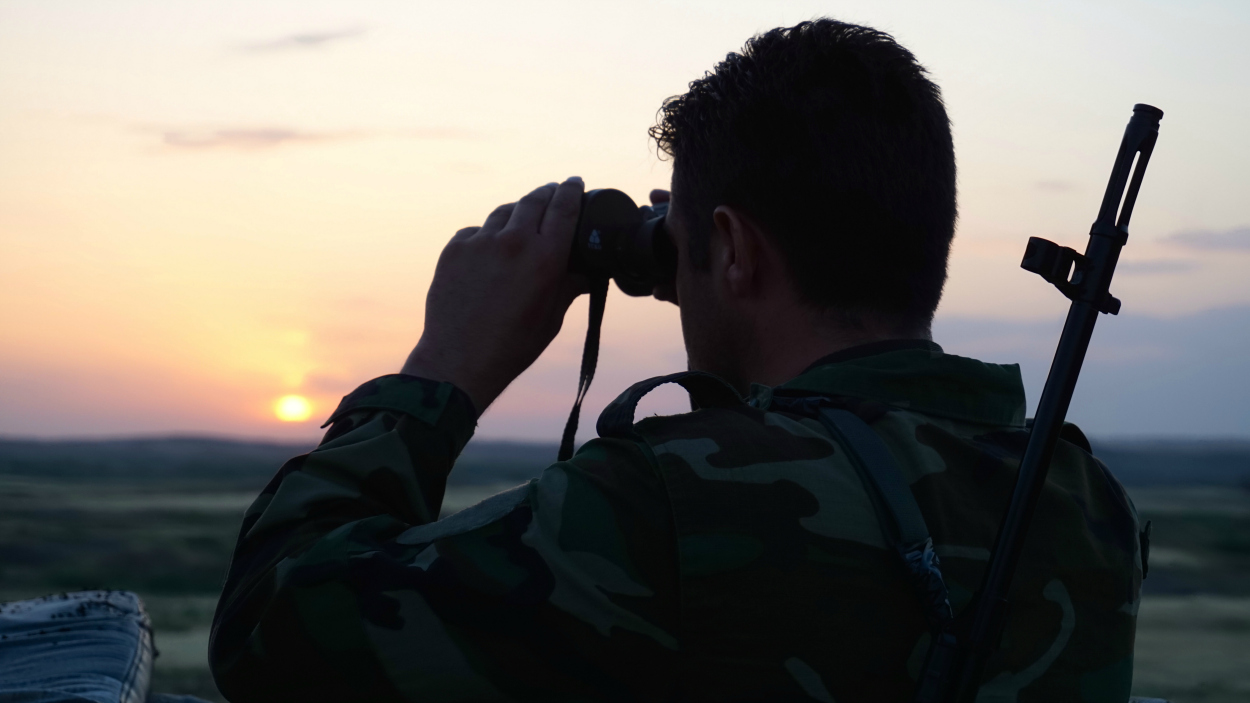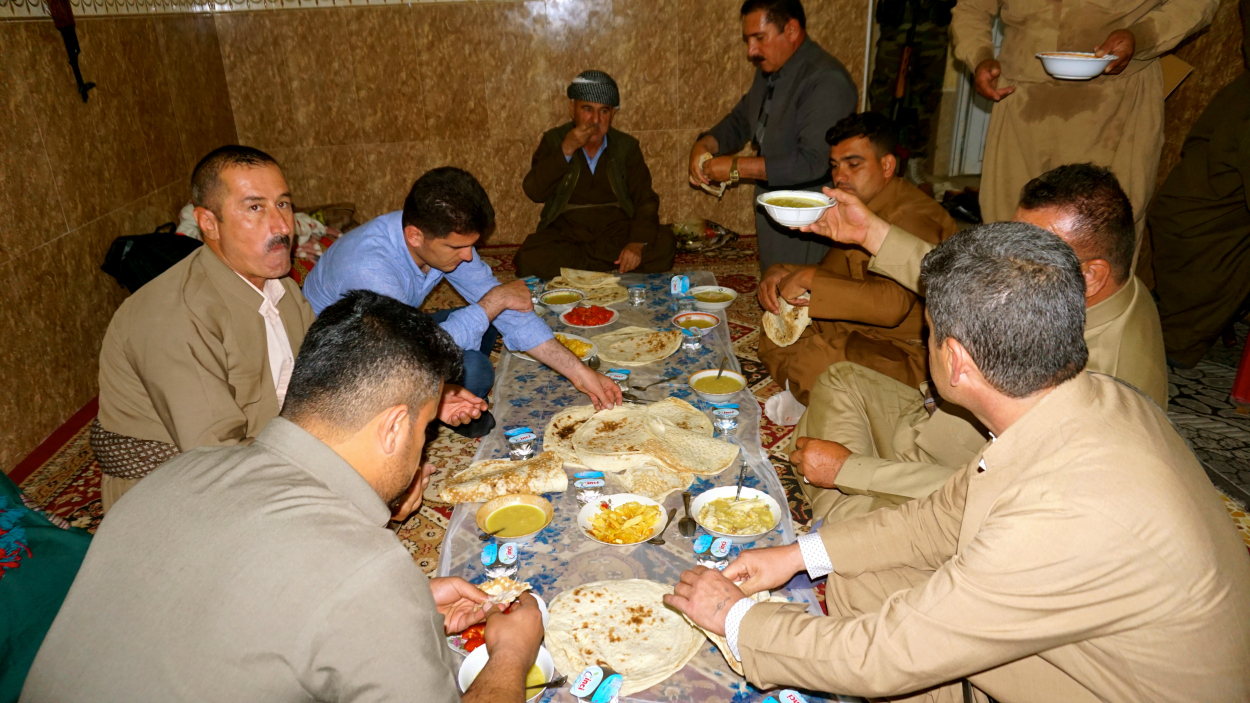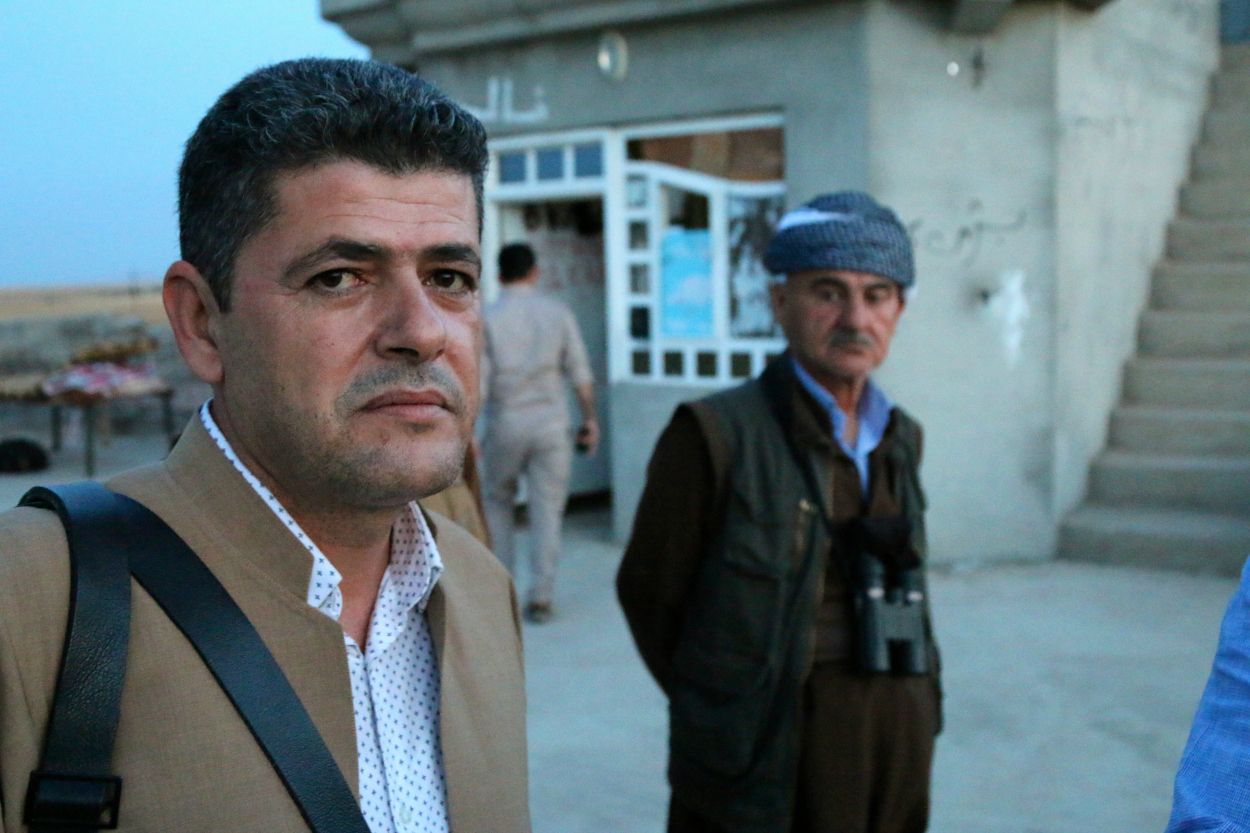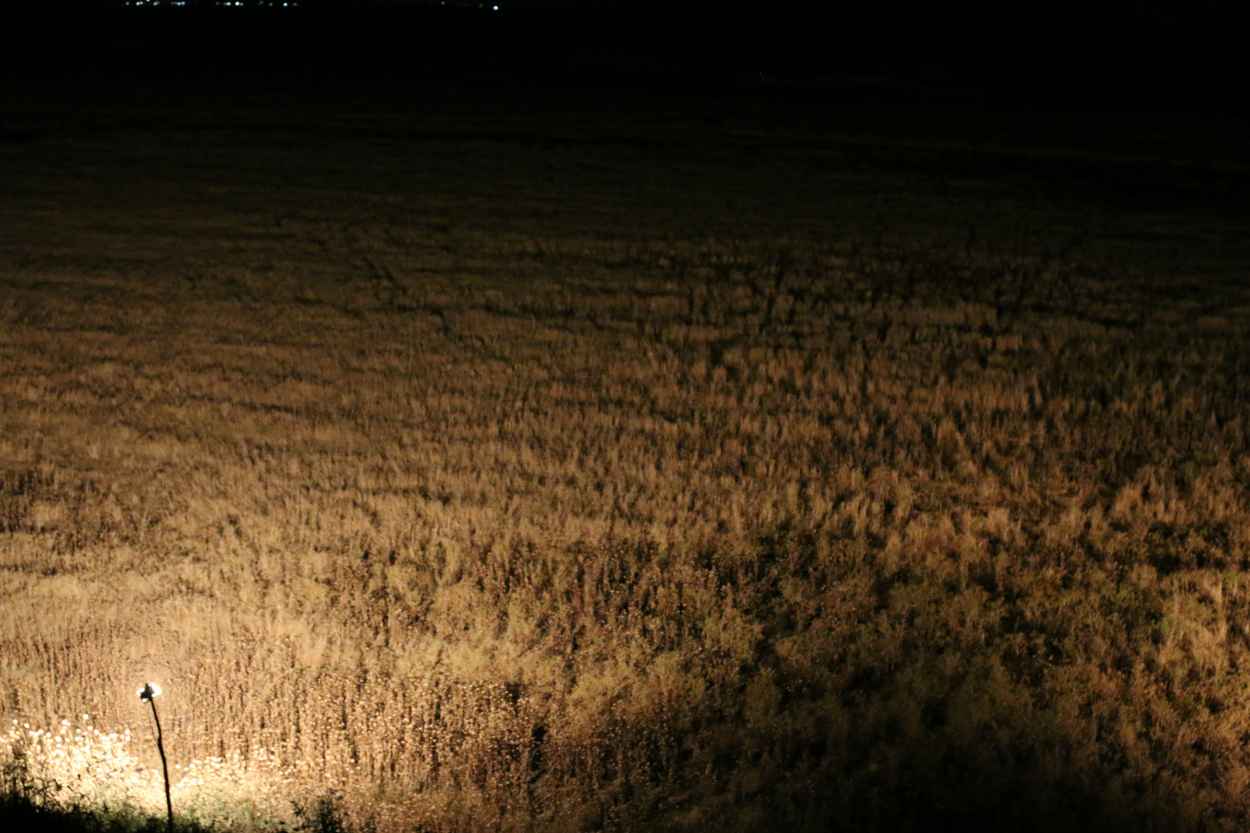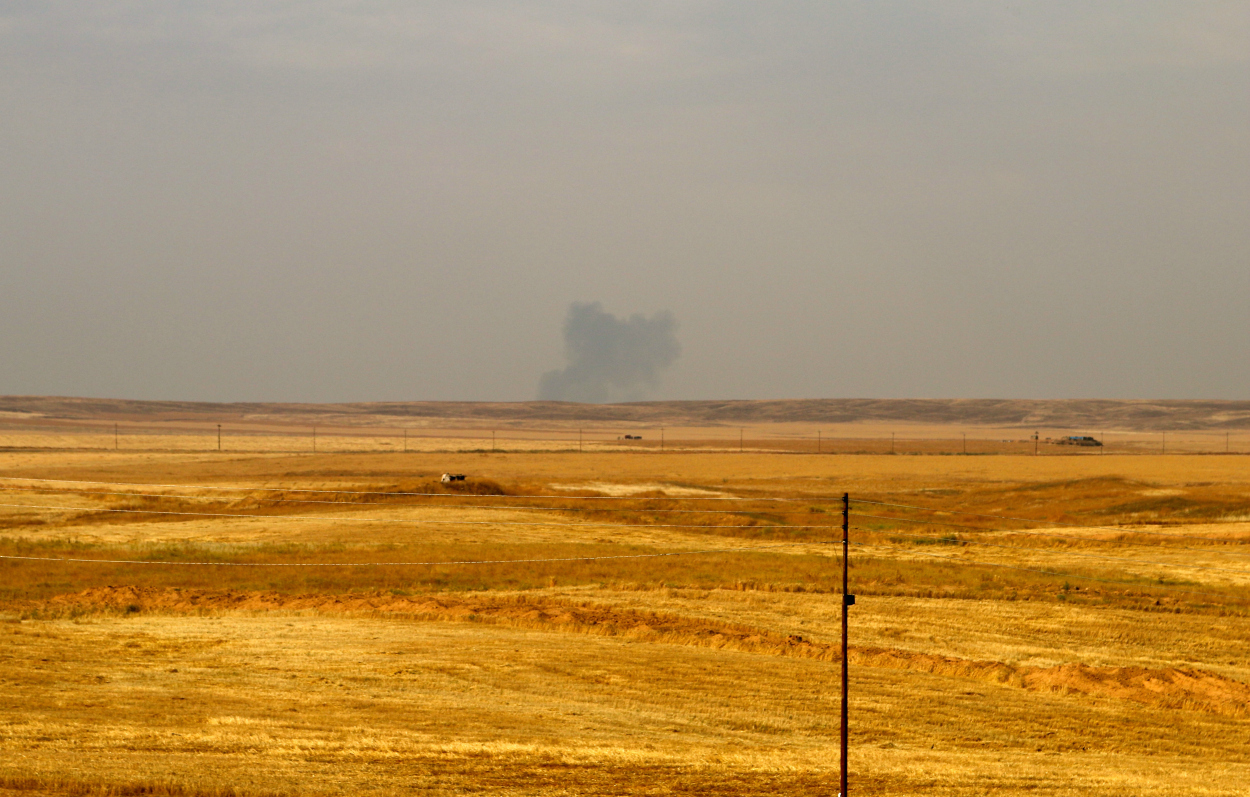MOSUL FRONT, Iraq—The old peshmerga general smiled at the sound of the U.S. fighter jets. “That’s the sound of God,” he said.
Gen. Omar Hama Ali Farag held a pair of binoculars to his eyes, scanning Islamic State positions about a mile away, across the Great Zab River in the direction of Mosul.
“There’s two Daesh fighters hiding beneath a tree in front of the white house,” Farag told me, using a pejorative Arabic acronym for the Islamist terrorist army also known as ISIS.
He handed me the binoculars. “Have a look.”
And there they were. Clear as day and in the flesh.
The black-clad foot soldiers of the terrorist army responsible for so much death and destruction across the Middle East, North Africa, Central Asia, Europe, and even back home in the United States. Disciples of the same twisted group that had brutally killed the American journalist James Foley, a friend of mine who had graduated a few classes ahead of me at Northwestern University’s Medill School of Journalism.
I couldn’t help it. A smile spread over my face as the sound of U.S. fighter jets roared overhead. As a former Air Force pilot, I was acquiring a unique education in the awesome ground level effects of my former profession.
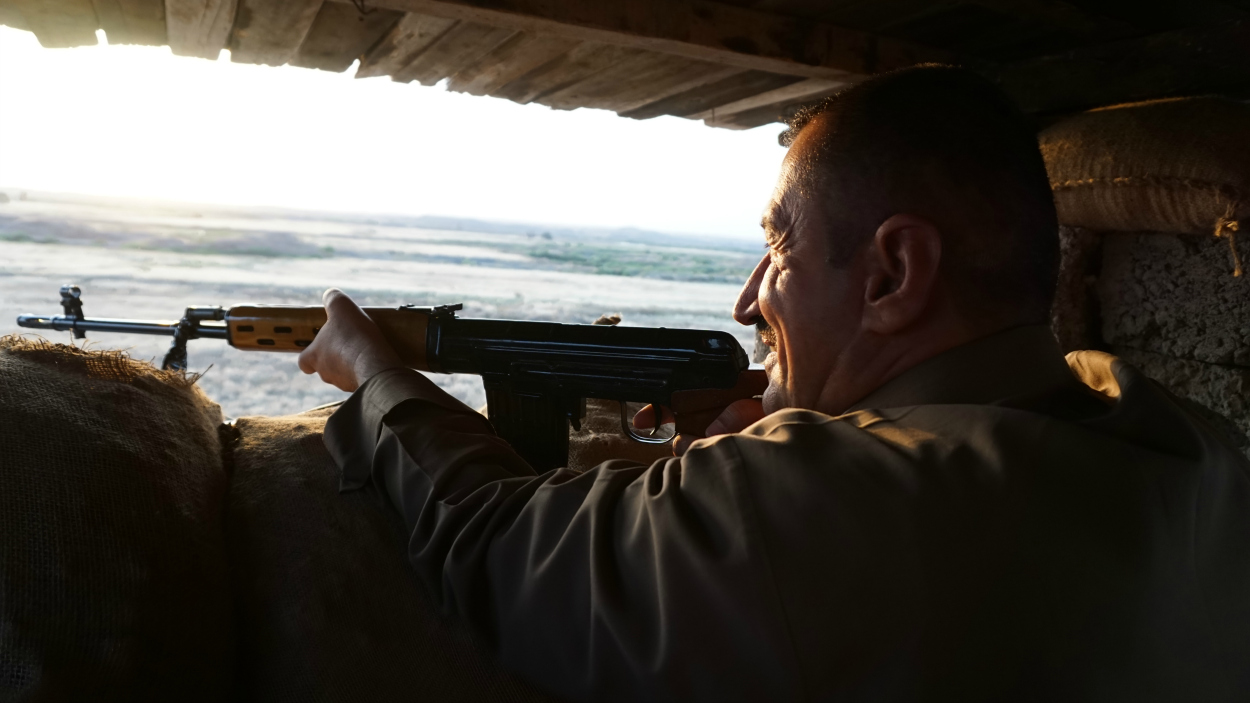
Peshmerga soldiers frequently take potshots at ISIS positions. (Photos: Nolan Peterson/The Daily Signal)
The sun was setting behind a line of hills in the direction the general and I were looking. Some of Farag’s soldiers, about a dozen of them, were on the roof of the fortified compound with us.
Small in stature with a trimmed salt and pepper moustache and wearing a black and white turban, Farag paced back and forth among his men with his hands clasped behind his back. At times he had a fatherly air. In other moments, which coincided with the thumps of airstrikes, his eyes narrowed and his face transformed into a remorseless expression I have seen only among soldiers.
Farag commanded about 300 Kurdish peshmerga troops scattered along a 12-mile stretch of front lines in hilltop forts and fortified compounds like this one. They comprised part of a tightening noose of Kurdish military positions around the Islamic State stronghold of Mosul.
As the U.S. fighter jets roared above, the peshmerga soldiers, many wearing turbans and traditional Kurdish sal u sepik uniforms, pointed to the sky, laughing and smiling. Empowered by the air support, a few soldiers fired potshots toward the enemy lines with their Kalashnikovs and the one U.S.-made M-16 assault rifle in their possession.
The peshmerga soldiers knew I was a former Air Force pilot, and my presence animated them. We shared only a handful of words, but an unspoken language united us. Jet noise and the concussion of airstrikes was our common vocabulary.
The sun was low, and the sky was clear. At times the U.S. jets were clearly visible; the outline of an F-16 fighter jet cast against the clear, dark blue, end-of-day sky.
A jet roared overhead, followed by the thud of a distant airstrike invisible from where we stood. A flock of startled birds took flight, framing the view toward the sun as it dipped below the distant hills.
‘A Big Chance’
For the Kurds, the U.S. fighter jets symbolized the support of a foreign power, which they considered to be an essential ally in the war against ISIS. And, as I would discover through hours of conversation with these soldiers (thanks to my translator), their eyes were set on more than the immediate enemy on the horizon.
“In the past we’ve had so many wars,” 33-year-old Kawa Tofiq told me. “We had the wars against Saddam, the Anfal genocide. But this war against Daesh is a big chance for us to get our independence.”
The peshmerga feel like they’ve proven themselves as the world’s most reliable ground force ally in confronting ISIS. Because of this, the Kurds say that when ISIS is defeated it will be time for a sovereign, independent Kurdistan free from Baghdad’s vassalage.
“We stopped Daesh,” Farag told me. “And after we destroy Daesh, it’s our time. We deserve our independence.”
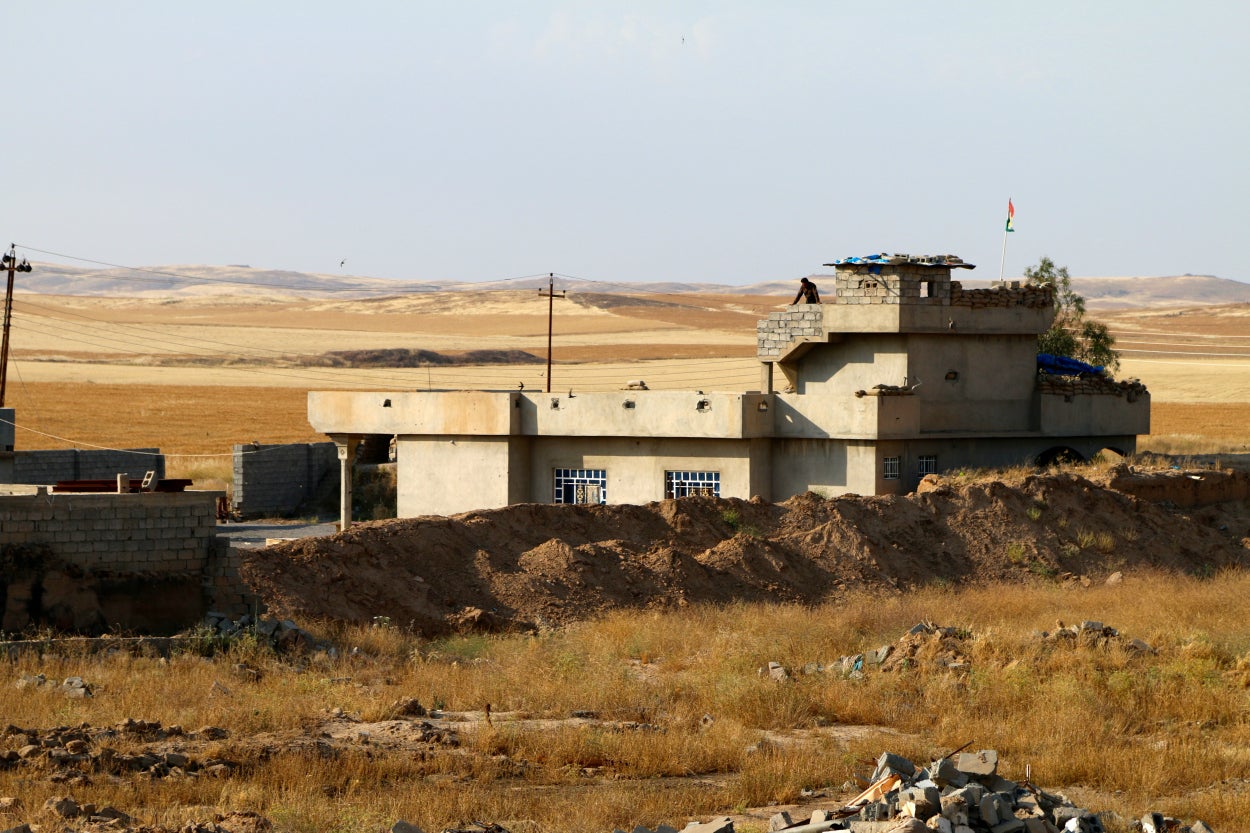
The Kurdish peshmerga defend the front lines outside Mosul from scattered forts and compounds like this one.
For the older peshmerga soldiers, the U.S. fighter jets roaring overhead represented long overdue justice and pitiless retribution against Saddam Hussein’s former Baathist commanders now serving in Islamic States’ ranks.
It was those Baathist commanders who played a role in the Iraq dictator’s campaign against the Kurds during the 1991 Kurdish uprising. They also carried out the al-Anfal campaign in the late 1980s, when Saddam’s regime killed more than 180,000 Kurds in a genocide that included the use of chemical weapons.
The sound of jet engines used to terrify the now graying, potbellied, older peshmerga soldiers such as Farag. They remember when the sound of Saddam’s warplanes accompanied suffering and death on an unimaginable scale.
“Now the sound of the planes makes me happy,” Farag said. “I can’t explain how important the U.S. planes are for us. If we can’t hear the sound of the planes, we can’t stay here and fight.”
Clear Skies
The sky is clear, which fills me with relief. ISIS likes to attack when it’s cloudy or raining. The terrorists know U.S. warplanes are less effective at snuffing them out in bad weather.
But on days like this, with barely a cloud in the sky, there is no hiding from the U.S. warplanes and drones orbiting overhead. For that reason, as we raced along a long, straight road toward the peshmerga’s front lines against ISIS outside Mosul, I felt thankful for the blue skies above.
Like my many trips to the front lines in Ukraine, the transition from peace to war came quickly here in Iraqi Kurdistan.
In less than an hour by car, I went from the glitzy shopping malls and fast food restaurants of Erbil, Iraqi Kurdistan’s capital city, to front-line forts where one has to seriously worry about chemical weapons attacks and the real possibility of being beheaded or burned alive if taken prisoner.
For breakfast at the hotel that morning I had an omelet and a pain au chocolat along with an Americano coffee. Back in my room, I flipped between CNN International and BBC World News on the TV as I dressed before heading to the gym. Later, after showering, I had lamb kebab with grilled vegetables for lunch in an outdoor terrace surrounded by olive trees. I sent a few emails, did some reading, and then it was time to go to war.
At the appointed hour, my fixer and his twin brother, both peshmerga soldiers, arrived at the hotel in a silver SUV. They had a polished Kalashnikov stashed up front and my fixer kept a pistol tucked in the back of his trousers.
‘Ameriki’
We took off through central Erbil, driving past fast-food restaurants like Kentucky Fried Chicken, Hardee’s, and Pizza Hut.
Minutes later we were out of the city. Fast-food restaurants on the roadside gave way to goat herders and their flocks. This land’s ancient rhythms of life still beat beneath its modern surface.
We drove through the first Kurdish police checkpoint, where the guard waved us through with little hassle. My companions’ father was a peshmerga colonel, and family connections are a priceless commodity in this culture.
“Ameriki,” the driver said, nodding toward me in the back seat. The guard smiled and gave the Kurdish greeting, a raised hand at shoulder level with the palm facing out.
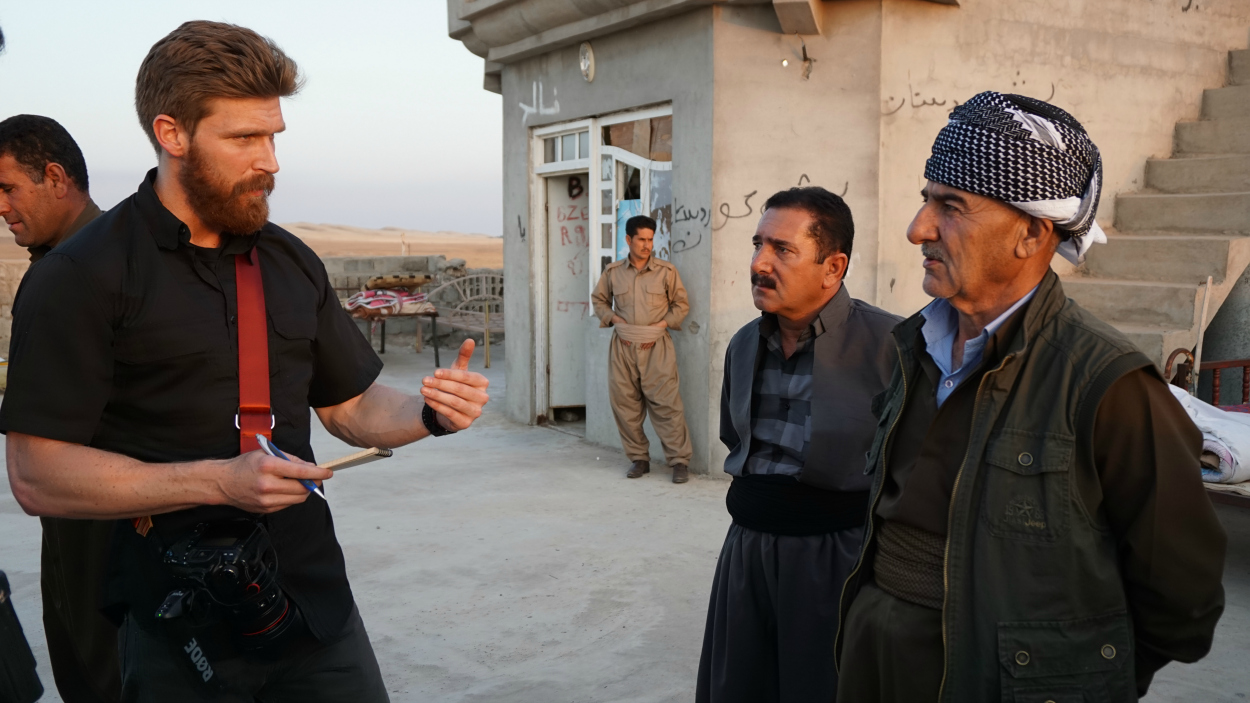
The author, left, interviews peshmerga Gen. Omar Hama Ali Farag, far right, on the front lines outside Mosul.
We traveled south and then west, heading toward the southern flank of the peshmerga’s front lines surrounding Mosul. We passed through a rolling landscape of wheat fields and high, eroded hills to the south. On the side of the road, only a couple miles from the front lines, I saw a father helping his son onto a horse. They were alone in a field. A moment later we passed a fire-scarred section of the road framed by eroded trenches on either side.
“Daesh took over this area in 2014,” my fixer said. “Most of these people fled. But when we kicked Daesh out, they came back. Life goes on.”
Tipping Point
A combined Iraqi-Kurdish offensive to take back Mosul has become the war’s focal point in Iraq. For the White House, booting ISIS from Iraq’s second most populous city would prove America’s strategy to defeat the terrorist army is working.
For the triumvirate of ground forces combatting ISIS in Iraq—the Iraqi army, the Iranian-backed Shiite militias, and the Kurdish peshmerga—the Mosul campaign likely will be the opening salvo in a new struggle to define what a post-ISIS Iraq will look like.
A recent wave of ISIS terrorist attacks amid political upheaval in Baghdad, as well as deadly clashes between the Kurds and Shiite militias, have fueled the prevailing opinion in Iraqi Kurdistan that Iraq in its current form is a failed state.
“Our priority is our independence, that is more important than anything,” peshmerga Brig. Gen. Bestwn Mohammad told me from his command post near the front lines in Gwer, south of Mosul.
The liberation of a series of smaller villages and towns on the way to Mosul has been a bellwether for the campaign, proving the Kurds are the most reliable and effective ground force in Iraq to combat ISIS. And ISIS’ regular use of suicide bombers and human shields also hints at how the battle for Mosul will play out.
But for now, as Iraq’s disparate ground forces constitute their strength in preparation for the Mosul campaign and politically maneuver for the day after, the war along the front lines outside the city remains static, fought from trenches, fortified compounds, and hilltop forts.
There is a predictable rhythm to the fighting on the Mosul front. Opposing camps take potshots across no man’s land, more to keep the other side on edge than to advance or take new ground.
Suicide Bombers
This war has some particularly nasty traits, however.
Along the Gwer front where I was headed, ISIS has a history of using chemical weapons. ISIS fighters launched mortars carrying mustard gas in three attacks from February to April, wounding at least 10 peshmerga soldiers. And in August, ISIS fired 45 mortars loaded with mustard gas on this section of the front.
Yet, among the peshmerga troops I visited, none had gas masks or protective suits. They had only a few bottles of bleach, with which they planned to douse themselves if ISIS used chemical weapons.
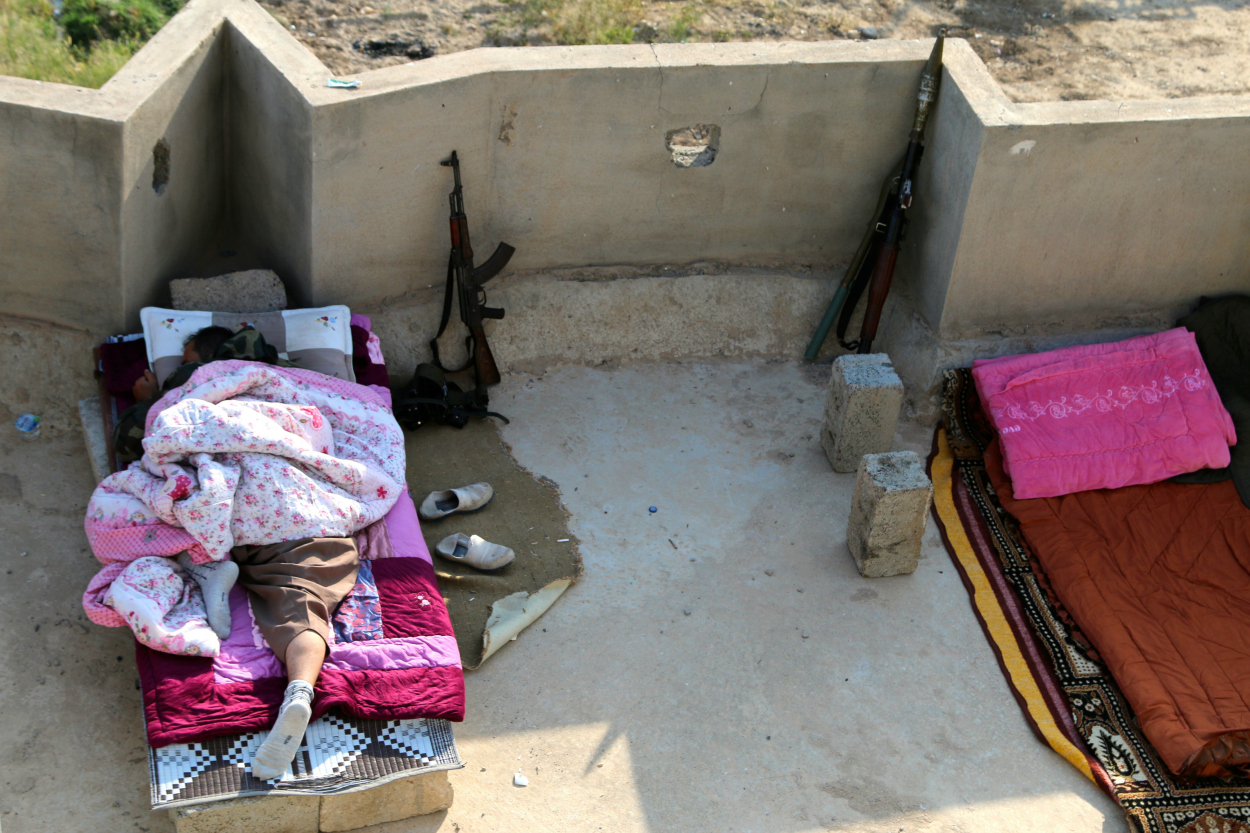
Many peshmerga soldiers sleep during the daytime so that they can remain alert at night when ISIS typically attacks.
(According to a 2013 study from the Medical Journal of the Islamic Republic of Iran, which analyzed the effects of Iraqi chemical weapons on Iranian soldiers during the Iran-Iraq war in the 1980s, washing the skin with household bleach is “useful” in mitigating the effects of mustard gas.)
“For 100,000 Peshmerga soldiers fighting Daesh on the front lines we have less than 5,000 [gas] masks that we received from coalition forces,” Peshmerga Ministry spokesman Jabar Yawar told Rudaw, a Kurdish news site.
Apart from the chemical weapons threat, ISIS attacks typically comprise mortars, artillery, and sniper fire. However, suicide bombers remain the biggest threat, peshmerga soldiers say.
“They can’t attack us directly,” Farag said. “Their main objective is to get their suicide attackers to our base.”
In January, two ISIS trucks laden with explosives charged Farag’s compound. The Kurdish soldiers fired small arms and rocket-propelled grenades at the trucks, but were unable to stop them.
The earth and the weather spared the Kurds. Winter rains had turned the ground into mud, and the ISIS kamikaze vehicles became mired in the morass. The bombs ultimately detonated a safe distance from the peshmerga compound, but the size of the blasts suggested the devastation would have been total.
“God saved us,” Farag said.
The most effective weapon against Islamic State suicide attacks, peshmerga soldiers say, is the European-made Milan anti-tank missile, of which the Kurds have a limited few in scattered positions around Mosul.
Along an 81-mile section of the front south of Mosul, the Kurds have only one Milan launcher. At the positions I visited, Soviet-era RPG-7s were the heaviest weapons available.
Special Occasion
After sunset, Farag directed me downstairs for dinner.
We took off our shoes before entering a carpeted room decorated with the trappings of war. A Kalashnikov and binoculars hung on the wall. In a corner was a pile of weapons and ammunition, including a Soviet-era rocket-propelled grenade launcher and a crate of warheads. A prayer rug was spread out on the floor against the far wall, where a soldier was performing Salaat, the Islamic prayer ritual.
In the center of the room, dinner was served on top of a plastic sheet—flat bread, tomatoes, barley soup, and fried potatoes. Around the meal, a dozen soldiers sat on the floor with folded legs.
I took my place next to Farag, and as we dug into the food he apologized profusely for not serving any meat. The soldiers didn’t normally have this much to eat, he explained, but they considered my visit to be a special occasion worth celebrating.
I thanked him for his hospitality and then presented a bag full of gifts I had purchased from a grocery store in Erbil: A carton of Marlboro Reds, jars of peanut butter and Nutella, and a jumbo-size package of Nescafe Gold instant coffee.
It was a modest offering, but I might as well have brought the moon based on the soldiers’ overjoyed expressions of thanks.
Scenes like this have played out in these lands since biblical times. Warriors gathered around a meal, talking about life, love, politics, memories of the fallen, and the mystery of faith. I felt I was in the presence of something ancient.
I knew I was only a journalist, a journeyer, and a witness to this war. But the peshmerga treated me as an honored guest. In their eyes I symbolized all of America. And as a former Air Force pilot, I was a human face to which they could attach the sounds of the jets and the bombs, which continued to rumble outside as we ate.
Reasons Why
Eager to take advantage of their guest’s assumed omnipotence, the soldiers peppered me with questions. They were especially curious about the upcoming U.S. presidential election and which candidate would prove to be a greater friend to the Kurds.
As for the peshmerga soldiers, I wanted to know about their motivations. “What are you fighting for?” I asked.
For some, ISIS’ brutality sustained their will to fight.
“When I see what Daesh does, it gives me the moral justification to fight,” 23-year-old Harem Hassan Ahmad said.
For others, the fight against ISIS is a family affair. Peshmerga Capt. Loqman Habib Jafar, 42, said his nephew was killed fighting ISIS. I asked Jafar if he hated his enemy.
“Too much,” he replied.
Farag has 18 children from his two wives. His oldest is 37, and his youngest is 3. Some of the younger soldiers joked that he was a “busy” man.
Five of Farag’s sons are peshmerga soldiers, as are five of his brothers. In all, 43 of his relatives had served in combat against ISIS.
Mohammad, the brigadier general, sat beneath a portrait of Masoud Barzani, president of Iraqi Kurdistan. The 45-year-old general spoke in a halting, deliberate cadence, as if to emphasize the weight of every word.
He told me his two brothers were both peshmerga soldiers, as was his oldest son. He has three younger sons, and he expects all of them to serve one day.
“All of us should be ready to protect our people,” Mohammad said. “We’ll never let the enemy take our lands.”
Tofiq is married and has a 4-year-old boy and a 3-year-old girl back home. He said his wife was proud of him for being a soldier.
“She has the same opinion as me that we have to defeat the enemy,” he explained. “To be a martyr is nothing, the only thing that matters is victory.”
When I asked Tofiq what he was fighting for, he quickly replied: “Humanity.”
“Our priority is not ourselves,” he said. “In the past, we only fought for our independence, now we are fighting for the world.”
Farag added:
Daesh is worse than the enemies we’ve faced in the past. They behead women and children. We are obliged to do this fighting. We are fighting for the world. If we don’t stop Daesh here, they will go all the way to Europe.
Redemption
The Kurds are the world’s largest stateless minority. According to varying estimates, the worldwide population of Kurds is about 30 million, with about 5 million in northern Iraq.
A largely Sunni Muslim people, the Kurds trace their roots back to the Medes, an Indo-European people who established an empire around the sixth century B.C. The names of famous Kurds throughout history range from Saladin, the Muslim warrior who united the lands of Islam and drove crusaders from Jerusalem in 1187, to Hamdi Ulukaya, founder and CEO of the yogurt brand Chobani.
The Kurdish soldiers I met on the front lines outside Mosul expressed affection for the United States.
At dinner, I broached the subject of past American missteps, such as the failure to militarily back the Kurds in their 1991 uprising against Saddam after the Persian Gulf War, as well as the U.S. turning a blind eye to the al-Anfal genocide in the late 1980s.
The soldiers dismissed the shaky history of U.S. support. Instead, they pointed to Operation Provide Comfort and the U.S.-enforced no-fly zones throughout the 1990s, which allowed Iraqi Kurdistan to blossom as an autonomous territory. And they were grateful for the 2003 invasion to topple their nemesis, Saddam Hussein.
“We are in debt to America,” Farag said, adding:
We will be friends with America forever for the help they’ve given us. We had the Anfal genocide and many sufferings, but the peshmerga have always seen America as our friend. We could have never gotten rid of Saddam without George W. Bush. And we can never have our independence without America’s help.
After dinner, we had tea. Soldiers took turns using the prayer rug to perform Salaat. And then the room began to clear. One by one, soldiers gathered their weapons and headed to the roof. The last embers of daylight had faded and night had arrived.
The Dark
At night, Islamic State patrols and suicide bombers creep across no man’s land to launch attacks. Consequently, the peshmerga soldiers stay awake and alert, cradling their Kalashnikovs, scanning the pitch-black night for their enemy.
The peshmerga’s lines are not continuous. There are breaks more than a kilometer (about five-eighths of a mile) long in some places between the scattered compounds and forts. The intervening terrain is wide open with little foliage or natural relief for infiltrating ISIS fighters to use as concealment. Consequently, the night is their only camouflage.
Each peshmerga position usually has just one pair of night-vision goggles to share among more than a dozen soldiers. To compensate, the Kurds have strung light poles along the front, bathing the first few hundred yards of no man’s land in yellow light.
Beyond that is the void. The dark unknown lies in the unlit intervals between the peshmerga’s isolated positions.
The emptiness holds nothing, but also all the dark imaginings that a mind can produce. If you stare into the dark long enough, you see your fears manifest.
The quarter moon’s glow silhouetted two peshmerga soldiers standing on the roof of the compound. I reflexively jumped at the unexpected burst from a Soviet-made RPK light machine gun about 10 feet away.
The red tracers rocketed out and then seemed to slow down as they dipped toward the earth in the distance. Another gun joined in from a peshmerga position further down the line, maybe half a kilometer away. The tracers were beautiful as they flowed across the black void of no man’s land. There was some return fire, but I couldn’t tell from where.
Then it was quiet again, and scary. I thought back to books I’ve read about the Pacific theater in World War II—classics like “Helmet for My Pillow,” and “With the Old Breed.” I remembered stories about nights on battlefields in Guadalcanal and Peleliu as U.S. Marines took turns sleeping in foxholes, ever fearful of Japanese soldiers lurking in the night ready to slip a knife into those who let down their guard.
Fear similarly consumed the night in northern Iraq. The hours passed slowly. A lurching, lethargic countdown from sunset at 7 p.m. until sunrise around 5 a.m.
When daylight arrived, most of the peshmerga soldiers dropped into a relieved sleep. A few stayed awake to keep watch, but the rosy-fingered dawn had washed away the fear of the night.
The soldiers’ minds once again were occupied by what they could see and hear, not what they imagined to be lurking in the void. On this morning, the clear sky and the sound of U.S. fighter jets orbiting overhead were as comforting as a warm blanket, and the soldiers easily glided into a deep sleep.
Justice
It was morning now, and I was on the roof of another peshmerga fort about 2 kilometers from where we were the night before. To get there we passed an unprotected stretch of the lines.
My companions, the peshmerga twins, drew their weapons and pointed them out the windows of the SUV as we accelerated to cross this undefended section of the front. ISIS fighters frequently slipped in here at night to set up ambushes; a peshmerga general had been attacked on this stretch of road just a week ago.
But there was no attack on this day. We arrived without incident.
I stood on the roof of the other compound and talked with the unit’s commander, Lt. Col. Bahaddin Qadir. The morning was crisp and clear. Hardly a cloud in the sky. A soldier was splayed out on a cot on the roof, immune to the world in a deep sleep, a Kalashnikov and a RPG launcher propped up beside him.
Just a few days ago they were taking heavy sniper fire here, Qadir explained to me as we rested our elbows on the low wall running along the roof’s edge and peered across no man’s land.
Snipers. My heart sank. Snipers are a personal fear of mine. The mortars and the artillery I usually can handle OK. But snipers inspire a different kind of fear. Dark imaginings produce a kind of terror more potent than anything the eyes or the ears can achieve.
I thought about Ukraine and my close calls with the snipers there. I felt naked. My eyes darted back and forth along the low line of hills across the Great Zab River, less than a mile away, where the Islamic State’s lines were.
Every house, every tree, every boulder. Every crag, dip, or rise in the terrain. I imagined snipers hiding everywhere. I wondered how I would look through a scope at that range. Would there be any warning when the time came?
I ask Qadir what had changed. Why could we now stand up here on the roof with impunity?
“The clear weather,” Qadir replied. “Daesh knows the U.S. Air Force is up there, watching. They’re afraid.”
Qadir said the coalition airstrikes have been a game changer on the battlefield. The protective umbrella of air power had stopped ISIS dead in its tracks and boosted the Kurds’ morale. They felt like America had their back. Qadir said:
Personally, I’m so thankful for the airstrikes. I can remember having to hide from Saddam’s airstrikes. Now our enemy suffers the same fate. That makes me so happy.
Qadir echoed what I heard up and down the peshmerga lines. He emphasized the need for heavy weapons, night-vision goggles, and protective gear from chemical weapons. He also singled out the Milan as a particularly effective weapon to stop ISIS suicide car bomb attacks.
‘Keep the Bombs Coming’
Qadir said ISIS attacked this position in December with a pair of trucks laden with one and a half tons of explosives apiece. The peshmerga unit had only small arms and one Soviet-made Dushka machine gun to thwart the attack. They managed to stop the kamikaze charge—barely.
“Every one of us would have died if they had broken through,” Qadir said.
A dog began barking down below. A flock of startled birds took flight. Then the earth rumbled with a bass thud that felt like someone was blowing air in your ear. The sound of an airstrike.
All four of us on the roof exchanged looks. Smiles crept across our faces. My feeling of nakedness at the thought of snipers gave way to a rebounding sense of empowerment. Jet noise growled overhead and then another boom, and another, and another, and another.
An inky blue-black mushroom cloud lifted above the horizon south in the direction of Makhmur, a hot spot on the front lines and the closest Iraqi army position to Mosul.
For a few moments, the growl of jet noise overwhelmed the barking dog. And then all the sounds receded and the billowing mushroom cloud high above the horizon was the only remaining evidence of the airstrikes.
Qadir rubbed his sleepy eyes, smiled, and casually leaned against the wall, his back turned toward no man’s land.
“You know, we don’t even need a salary,” he said. “I say give our money to the U.S. Air Force. Keep the bombs coming.”























